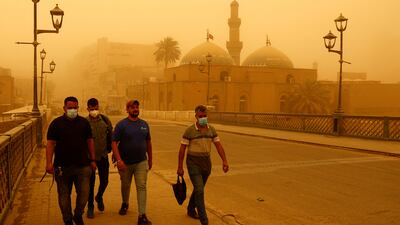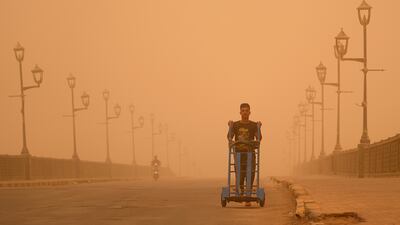Millions of Iraqis endured another dust storm day on Monday, the latest in an unrelenting spate that has blanketed the country since April.
The night before, the government declared Monday a public holiday except for the health, security and services departments. The Iraqi Civil Aviation Authority also decided to suspend all flights until further notice.
Iraq's Meteorological Authority said the country had been hit by an anticyclone coming from the eastern Mediterranean with wind speeds of between 40 and 50 kilometres per hour, lifting dust and sand from the vast expanses of desert in western and north-western parts of the country.
Almost all of Iraq will be hit by the latest storm which could last until Tuesday afternoon and is expected to cross to the Gulf States, it added.
Authorities urged Iraqis to stay indoors as much as they can, to seek treatment for breathing difficulties and put on surgical masks if they need to go out. A hotline has been set up for emergencies.
The storm has left the usually traffic-choked Iraqi streets largely deserted with a thick layer of orange dust settling across the buildings and vehicles. The storm has been more severe in the provinces of Najaf and Karbala, south of Baghdad, turning the skies orange.
Rescuers have been deployed outside to offer first aid for those with breathing difficulties, giving them oxygen either inside the ambulances or on pavements.
The strongest storm was felt at the Iraqi-Syrian borders. In one video published on social media by security forces showed the dust engulfed a trailer as at least two men covered themselves with sheets on beds while tumultuous storm lashing outside.
By Monday afternoon, flights had been resumed at all airports.
Iraq is the fifth most vulnerable country in the world to the effects of climate change, according to the UN. It faces a wide range of challenges made worse by water insecurity, mismanagement and man-made issues such as the illegal razing of agricultural areas to build houses.
Among the devastating consequences of rising temperatures are droughts and desertification.
About 39 per cent of the country is affected by desertification and 54 per cent of its agricultural lands have been degraded mainly by soil salinity caused by reduced water flows in the Tigris and Euphrates rivers, a declining precipitation rate and sea level increases, the UN says.
Iraq is no stranger to sandstorms, but they have been much more frequent in recent years as the country reels under mounting environmental challenges.
Earlier this month, one person died and more than 5,000 were admitted to hospital suffering from breathing difficulties, according to the Health Ministry.




















